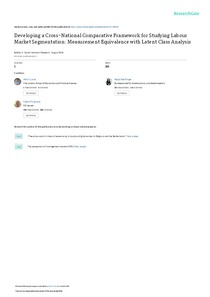Developing a cross-national comparative framework for studying labour market segmentation: measurement equivalence with latent class analysis

Lukac, Martin ; Doerflinger, Nadja ; Pulignano, Valeria
2019
145
1
August
233-255
labour market segmentation ; labour market analysis ; research method ; social indicator
Labour market
https://doi.org/10.1007/s11205-019-02101-3
English
Bibliogr.
"This article proposes a novel measurement model of labour market segmentation in Europe for cross-national comparisons, tackling three drawbacks of current approaches: First, as segmentation is a multi-dimensional concept, it necessitates a complex measurement approach combining several indicators. Second, to date, we lack methodological evidence that earlier used measures are comparable across countries. Third, as any measure of social phenomena contains measurement error, segmentation research may be confounded by misclassification error. To overcome these drawbacks, we argue for modelling segmentation as a latent categorical concept by means of characteristics of the employment relationship. Our analysis shows that accounting for measurement non-equivalence in cross-national labour market segmentation research is crucial to arrive at reliable and unbiased comparative conclusions. The results demonstrate the importance of increased complexity in measuring labour market segmentation. Overall, this article serves as a methodological cross-national comparative framework for future quantitative analysis of labour market segmentation."
Digital
The ETUI is co-funded by the European Union. Views and opinions expressed are however those of the author(s) only and do not necessarily reflect those of the European Union or the ETUI.